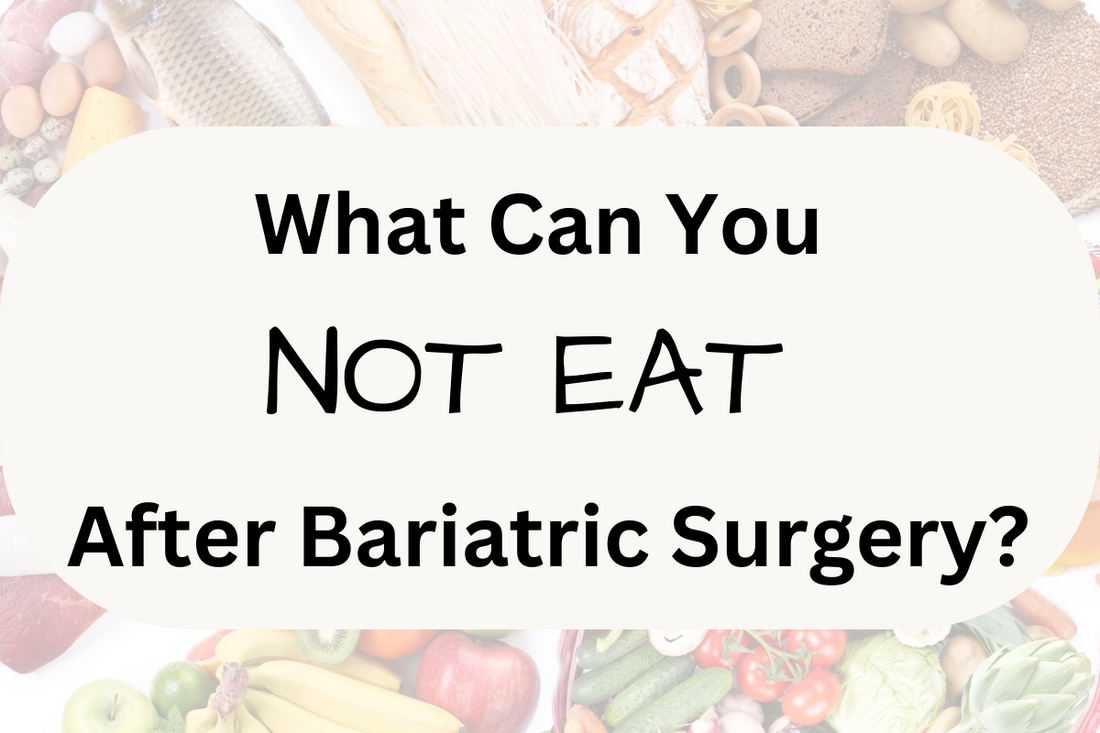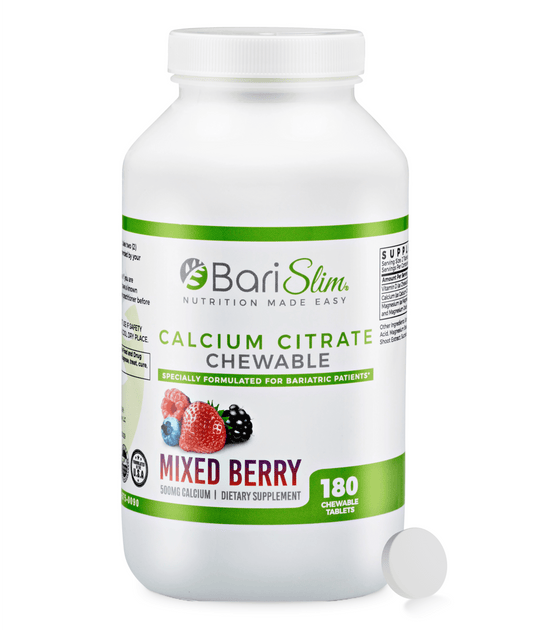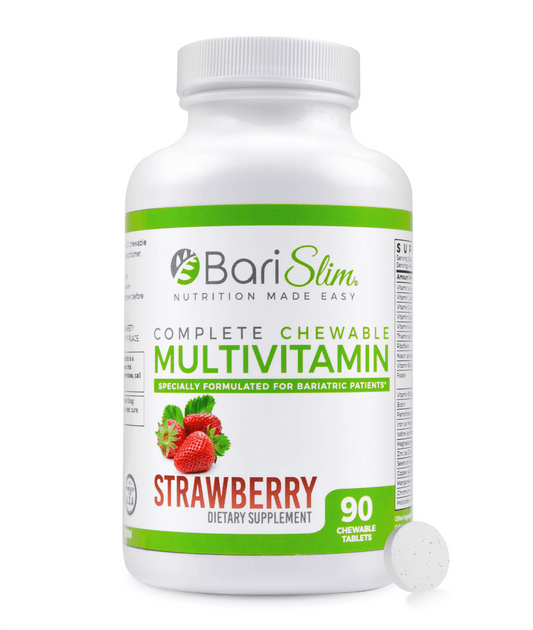Table of Contents
Bariatric surgery is a life-changing procedure that helps people lose weight and improve their overall health. After undergoing this surgery, you must adapt to a new way of eating and living to ensure successful weight loss and prevent complications. Your diet will undergo a significant transformation as you learn to navigate the dos and don'ts of eating post-bariatric surgery.
Following your procedure, your stomach will be smaller, and you'll need to eat smaller portions to accommodate this change. Also, some foods can cause discomfort or potential harm to your newly formed stomach. It's crucial to understand the dietary restrictions and guidelines you need to follow as you embark on your weight loss journey.
In this article, we'll discuss the types of foods you should avoid after bariatric surgery and why it's important to stick to the recommended eating habits. Implementing these changes will allow you to lose weight and enjoy a healthier lifestyle following your surgery.
Beverages

Sugary Beverages
After bariatric surgery, avoiding sugar-filled beverages such as sodas, fruit juices, and energy drinks is crucial. These drinks are high in calories and can hinder your weight loss progress. Additionally, consuming excessive sugar can cause dumping syndrome, a condition in which food and liquids move too quickly through your stomach, leading to nausea, vomiting, and diarrhea.
Alcoholic, Carbonated, or Caffeinated Beverages
Following your surgery, it is advisable to stay away from alcoholic, carbonated, or caffeinated beverages. Alcohol contains empty calories and can slow your weight loss while increasing the risk of developing alcohol use disorder. Carbonated beverages can cause bloating, gas, and stomach discomfort due to the gas bubbles they contain. Caffeinated drinks, such as coffee and tea, can lead to dehydration and irritate your stomach.
- Alcohol: Avoid consuming alcoholic beverages post-surgery. They can lead to excess calories and disrupt your weight loss journey.
- Carbonated Beverages: Steer clear of sodas and sparkling waters to prevent stomach discomfort, gas, or bloating.
- Caffeinated Drinks: Limit your intake of caffeine to avoid irritation and dehydration.
Smoothies
While smoothies can be a source of essential nutrients, they should be consumed cautiously after bariatric surgery. Certain ingredients, like fruit juices or added sugars, can be high in calories and sugar. Instead, opt for low-sugar, high-protein smoothies made with fresh, low-glycemic index fruits, such as berries, to ensure you provide your body with the necessary nutrients without hindering your weight loss progress.
Remember to prioritize consuming high-quality protein, avoiding added sugars, and carefully selecting your beverages to support your healing and weight loss journey after bariatric surgery.
High-Fat Meats

After bariatric surgery, you should avoid high-fat meats like sausage. Though they can be a source of protein, they also contain a high amount of fat, which can be difficult for your stomach to digest and may lead to weight gain. Eating low-fat alternatives, such as turkey or chicken sausage, can provide the necessary protein without the extra fat.
Similar to sausage, bacon is another high-fat meat that you should steer clear of after bariatric surgery. Consuming bacon may cause stress on your reduced stomach and contribute to weight gain. Instead of indulging in regular bacon, try opting for leaner alternatives like turkey bacon or Canadian bacon, which have less fat and are easier for your stomach to handle. However, remember that even these leaner alternatives should be consumed in moderation.
In addition to sausage and bacon, other high-fat meats like certain cuts of steak and fatty pork should also be avoided. These meats can exert excess strain on your digestive system post-surgery, potentially compromising your weight loss goals. Making wise choices concerning your protein sources is essential to ensure a healthy and successful recovery.
Fruits & Veggies to Avoid
Fibrous Vegetables and Fruits
After bariatric surgery, your stomach and digestive system need time to recover. To ensure optimal weight loss and avoid complications, you must avoid fibrous vegetables and fruits. These foods are difficult to digest and may cause discomfort or blockages.
Raw Fruits and Veggies
While fruits and veggies are generally healthy, consuming them raw can pose difficulties in digestion after bariatric surgery. Your stomach may not fully break down these foods, causing pain, discomfort, and even more severe complications. Therefore, consider cooking your fruits and vegetables and opt for softer options. Some examples of cooked vegetables and fruits include:
- Steamed carrots
- Mashed potatoes
- Cooked apples
- Baked pears
Dried Fruit
Dried fruit can be a great snack, but after bariatric surgery, it may not be the best choice for your sensitive stomach. These fruits have had their water content removed, making them more compact and concentrated. As a result, they are harder to digest and could cause stomach discomfort. Instead, focus on incorporating soft, fresh, or cooked fruits that are easier on your digestive system.
Greasy Food

After bariatric surgery, it is crucial to avoid greasy food as it can negatively impact your stomach and overall progress. Consuming high-fat, greasy food may lead to undesirable side effects and impede your weight loss journey.
Moreover, greasy food items like chips can cause weight gain, undoing the benefits of bariatric surgery. As your body adapts to the changes, making healthier food choices that align with your weight loss goals is essential. Remember that your long-term success depends on maintaining a balanced, nutritious diet.
Fast Food
Fast food is usually loaded with unhealthy fats and should be avoided post-surgery. Consuming fast food can cause discomfort, including nausea and vomiting, due to the reduced size of your stomach. To prevent these symptoms, choose healthier food options and take small bites while chewing thoroughly.
Limit Carbohydrates
After bariatric surgery, limiting your consumption of certain carbohydrates is important. High-carb foods are typically rich in calories and may lead to weight gain if consumed in large quantities. In this section, we'll discuss some common carbohydrate sources you should avoid or consume in moderation.
Bread
Bread is a common source of carbohydrates that should be limited after bariatric surgery. Traditional white bread, for example, is high in calories and lacks significant nutritional benefits. Instead, opt for whole-grain or multigrain bread, which contains more fiber and nutrients. Be mindful of your portion sizes to keep calorie intake in check.
Rice & Pasta
Rice and pasta are two other common sources of carbohydrates that can contribute to weight gain if not consumed in moderation. When consuming rice, consider choosing brown rice over white rice as it's higher in fiber and nutrients. For pasta, choose whole wheat or alternative options like chickpea or lentil pasta to increase fiber content and keep your calorie intake under control.
Pretzels
Pretzels are another high-carb food you may want to limit after bariatric surgery. While they may be low in fat, their calorie content can add up quickly, especially when consumed frequently or in large quantities.
Whole Grains

After bariatric surgery, paying attention to your dietary choices is crucial as you focus on weight loss and nutrition. Whole grains can provide essential nutrients, but some may be counterproductive for your calorie goals and overall recovery.
Granola, a popular whole grain option, can be high in calories due to its sugar and fat content. You should be cautious of consuming granola, especially those with added sugars. Instead, you can opt for alternative whole grains that are lower in calories, like quinoa or barley. These grains contain essential nutrients and fiber without the added calories of granola.
High-Sugar and Sugar Alcohol Foods
After bariatric surgery, you must avoid foods high in sugar and sugar alcohol. Consuming these foods can lead to several complications and hinder your weight loss progress.
Eating high-sugar foods can significantly increase your calorie intake, resulting in weight gain. Remember that your stomach is smaller after surgery, and consuming large amounts of sugar and sugar alcohols might take up valuable space that should be used for nutrient-dense foods. Instead, focus on consuming protein-rich foods and low-calorie liquids to stay satisfied and maintain your weight loss.
Another issue with foods high in sugar or sugar alcohol is that they can cause dumping syndrome, which is characterized by symptoms such as nausea, vomiting, diarrhea, and abdominal cramping. This occurs when the sugary contents rapidly move from your stomach to your small intestine.
Spicy Foods

After bariatric surgery, your stomach is more sensitive to certain foods, including spicy foods. Consuming spicy foods can irritate your smaller stomach pouch, leading to discomfort and potential complications. It is important to avoid spicy foods in your post-surgery diet to ensure a smooth recovery and maintain your overall health.
Spicy foods can cause a range of symptoms, including nausea, vomiting, and stomach pain. These symptoms can be particularly challenging for bariatric patients, as their stomach has limited capacity and may not be able to handle the intensity of the spices. The spices can also cause inflammation, leading to longer-term complications like gastritis or ulcers.
To help prevent these issues, you should gradually introduce foods to test your tolerance. Start with mild spices and see how your body reacts. If you notice any discomfort, scale back and give your stomach time to adjust.
Dairy

First, avoid whole milk and high-fat dairy products. These can contribute to weight gain due to their high calorie and fat content. Instead, opt for low-fat or non-fat dairy options. For example, choose non-fat or low-fat yogurt over whole milk yogurt. Traditional ice creams should also be avoided, as they are high in fat and sugar.
Eggs are a good source of protein but should be prepared without added fats, such as butter or oil. Try hard-boiled, poached, or scrambled eggs without cheese to meet your protein needs. You can also incorporate cottage cheese into your diet as it is low in fat and high in protein.
When it comes to cheeses, select low-fat options that are easier to digest and won't contribute to weight gain. Soft cheeses like mozzarella and feta are better choices as they typically have lower fat content than hard cheeses such as cheddar and parmesan.
Yogurt can be a nutritious and easy-to-digest choice after bariatric surgery. Instead of regular yogurt, opt for Greek yogurt, which is higher in protein and lower in sugar. However, be mindful of added sugar in flavored yogurts – stick to plain Greek yogurt and add your own fresh fruit for natural sweetness.
Keep in mind that some people may experience nausea or vomiting when consuming dairy products post-surgery. If this occurs, speak with your healthcare provider about potential lactose intolerance and alternative options for meeting your nutritional needs.
By making smart choices and selecting low-fat or non-fat dairy products, you can still enjoy the nutritious benefits of dairy while minimizing the risk of weight gain, nausea, and vomiting after your bariatric surgery.
Also Read: What Foods Can You Never Eat After Gastric Sleeve (List)



 Order Free Sample
Order Free Sample





